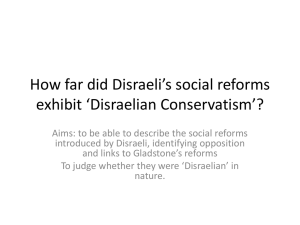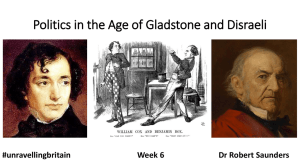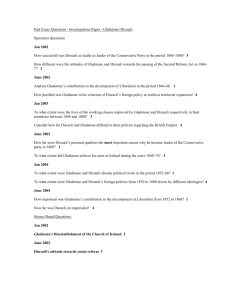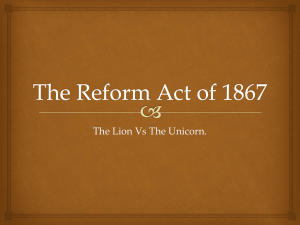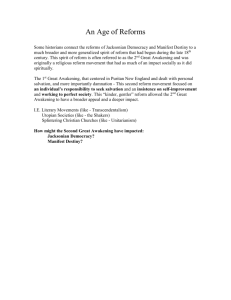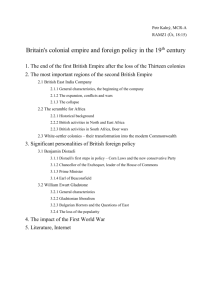The social reforms of the conservative government of 1874-78
advertisement
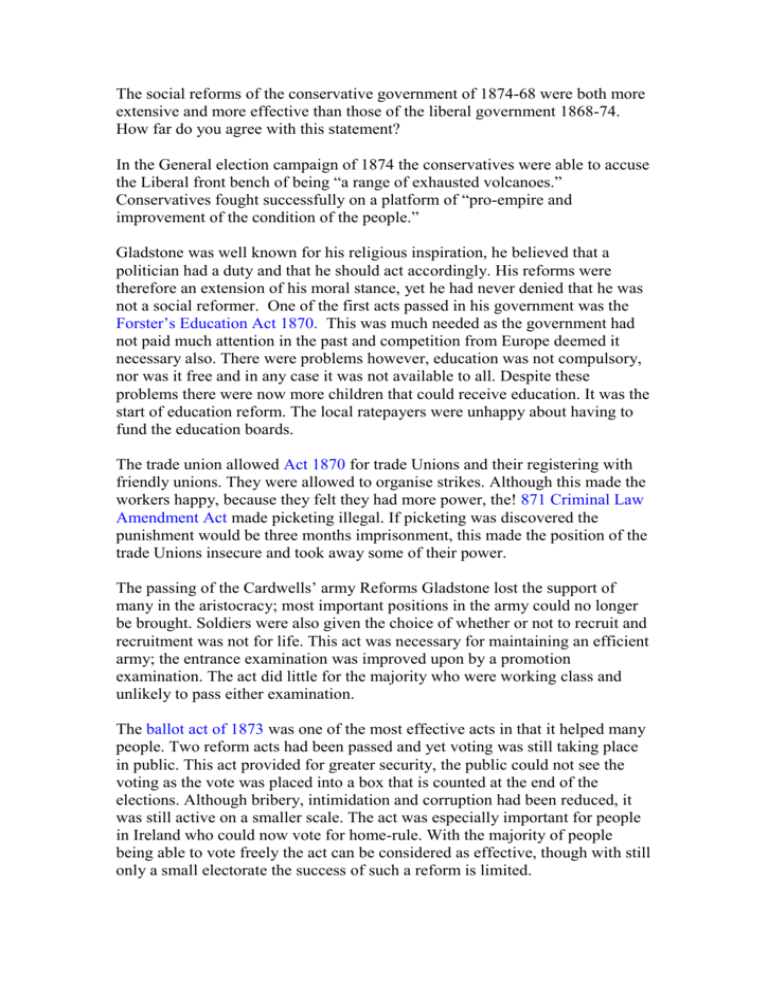
The social reforms of the conservative government of 1874-68 were both more extensive and more effective than those of the liberal government 1868-74. How far do you agree with this statement? In the General election campaign of 1874 the conservatives were able to accuse the Liberal front bench of being “a range of exhausted volcanoes.” Conservatives fought successfully on a platform of “pro-empire and improvement of the condition of the people.” Gladstone was well known for his religious inspiration, he believed that a politician had a duty and that he should act accordingly. His reforms were therefore an extension of his moral stance, yet he had never denied that he was not a social reformer. One of the first acts passed in his government was the Forster’s Education Act 1870. This was much needed as the government had not paid much attention in the past and competition from Europe deemed it necessary also. There were problems however, education was not compulsory, nor was it free and in any case it was not available to all. Despite these problems there were now more children that could receive education. It was the start of education reform. The local ratepayers were unhappy about having to fund the education boards. The trade union allowed Act 1870 for trade Unions and their registering with friendly unions. They were allowed to organise strikes. Although this made the workers happy, because they felt they had more power, the! 871 Criminal Law Amendment Act made picketing illegal. If picketing was discovered the punishment would be three months imprisonment, this made the position of the trade Unions insecure and took away some of their power. The passing of the Cardwells’ army Reforms Gladstone lost the support of many in the aristocracy; most important positions in the army could no longer be brought. Soldiers were also given the choice of whether or not to recruit and recruitment was not for life. This act was necessary for maintaining an efficient army; the entrance examination was improved upon by a promotion examination. The act did little for the majority who were working class and unlikely to pass either examination. The ballot act of 1873 was one of the most effective acts in that it helped many people. Two reform acts had been passed and yet voting was still taking place in public. This act provided for greater security, the public could not see the voting as the vote was placed into a box that is counted at the end of the elections. Although bribery, intimidation and corruption had been reduced, it was still active on a smaller scale. The act was especially important for people in Ireland who could now vote for home-rule. With the majority of people being able to vote freely the act can be considered as effective, though with still only a small electorate the success of such a reform is limited. The licensing act reduced the number of hours bars could stay open. This was an attempt to deter the working classes from wasting their much-needed money on alcohol, yet it served only to outrage the alcohol trade, the drinkers, many of whom probably drank in consolidation for their misery. There was a licensing authority in every town and thus a license was needed to set up a beershop, and to negotiate opening and closing times. The effectiveness of such an act depends on ones opinions of alcohol, though it did provide for a greater responsibility of the state for the people may even have reduced crime. A more democratic act, though less effective numerically, was the University test act. Previously only Anglicans could go to study at Oxbridge, now nonAnglicans could also attend. The act also serves to steer Britain in the direction of a secular state. For all its good intentions, Gladstone’s first ministry alienated more people than it satisfied. By 1874 the coalition of forces which had won the Liberals their victory in 1868 was split apart as every one of the Liberal policies succeeded in upsetting at least one influential group, not just in parliament but in the country as a whole. This in turn cost them the next election, and they stood aside as Disraeli went to work on his own programme of reforms. When Disreali became Prime Minister for the second time in 1874, his political motives remained generally the same. His social reform was still aimed to capture the votes of the newly enfranchised working classes, and to demonstrate that the Conservative party was the party ‘real reform’. However, Disraeli’s political motives were not were not so entirely Machiavellian, as they had been over the Second Reform Act. In his novel Sybil, written in 1845. Disraeli expressed the belief that helping the poor would benefit the entire state. This belief can be strongly traced through the social reforms of 1874 to 1876. After 1876 there were no noteworthy social reforms, since Disraeli was occupied with the Eastern Question. The Enclosures Act of 1876, which protected the public’s right to use common pasture land; the Conspiracy and Protection of Property Act, 1875, which legalised peaceful picketing and the support of individuals’ actions; and the Employers and Workmen Act, 1876, which made employees and employers equally liable for the breaking of a contract, were designed to win the support of the Trades Unions and thus the Working Classes by giving a good legal foundation to the Unions and demonstrating the Conservative concern for the cause of the working man. The Trades Unions were easily pleased by such measures, so that the Disraeli hoped to have their votes at least. This, too was a piece of one-up-man-ship on the Liberals, since they had legalised the Unions in concept only, and failed to recognise their right to peaceful protest. The Public Health Act of 1875 forced councils to clear refuse, clear sewage, provide an adequate water supply, regulate the sale of foodstuffs and notify a Medical Officer on the outbreak of any infectious diseases. The Artisans’ Dwelling Act of 1875, although not compulsory, paved the way for the clearing of the urban slums and the creation of decent housing. The Sale of Food and Drugs Act, 1875, laid down stringent regulations on the sale of adulteration of food. Although these act were augmented by the celebrated Richard Cross, and it has been argued that Disraeli had little interested in such reforms, nevertheless the demonstrate that one of Disraeli’s main political motives was to help the poor. Although Acts such as Sandon’s Education Act of 1876 were less successful, since they were not compulsory, such Acts paved the way for real advances in the sanitation and housing of over-populated urban areas. Disraeli’s new, democratic Conservatism recognised the social consequences of industrialisation and acted in accordance. Disraeli believed that improving conditions for the poor would strengthen, not weaken, the class division, as well as consolidate the traditional position of the Crown, Church and Aristocracy. It was a piece of pragmatism too, since Disraeli obviously recognised the power of hunger politics when he stated that ‘the palace is unsafe if the cottage is unhappy’. In the first two years of Disraeli’s second ministry, the British economy was doing tolerably well. However, by 1876, British industry ran into a serious depression, whilst agriculture suffered from foreign competition. By this time, Disraeli was embroiled in his foreign policy, and his social and economic policies suffered as a result. However, it can be clearly seen that Disraeli’s political motives in passing first political reform, in 1867, and later social reform, truly between the years 1874 and 1876, were pragmatic, design to ‘dish the liberals’, consolidate the Conservatives as the party of true reform, widen the Conservative voting base, help the poor and thereby strengthen the status quo, and ultimately keep the Conservatives in power.
